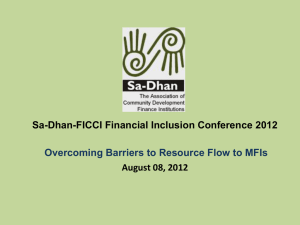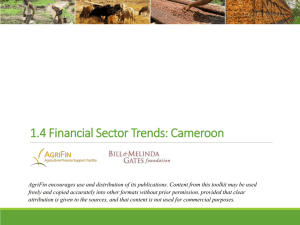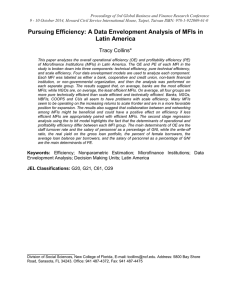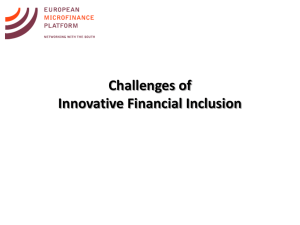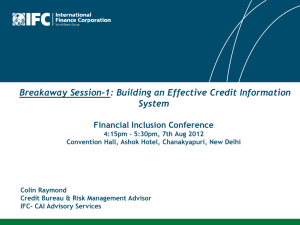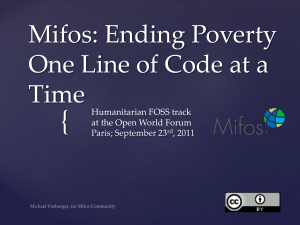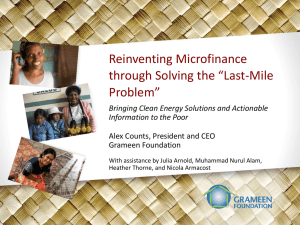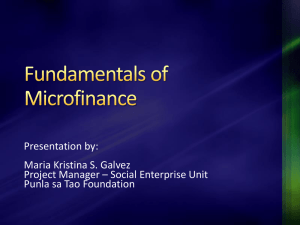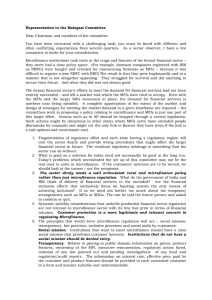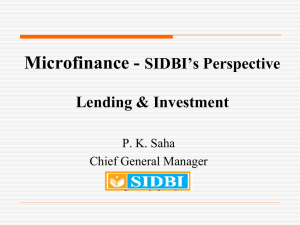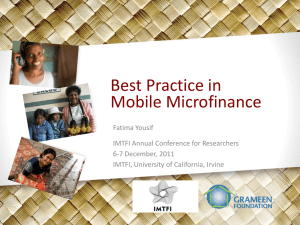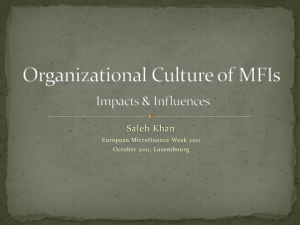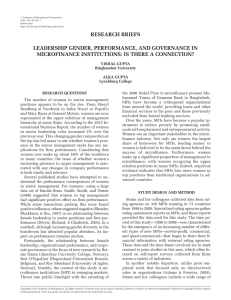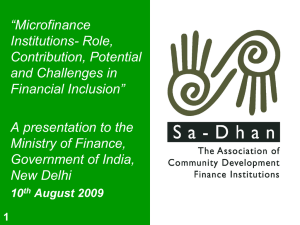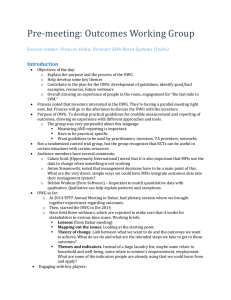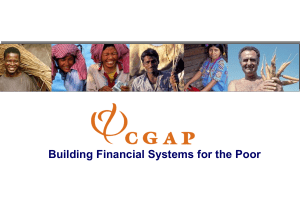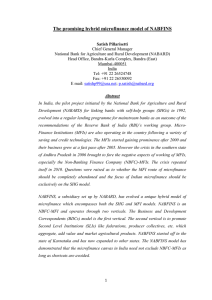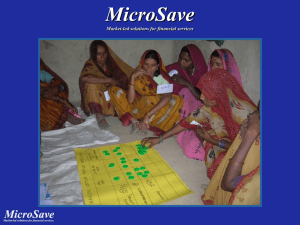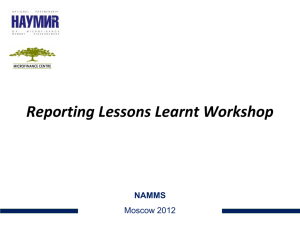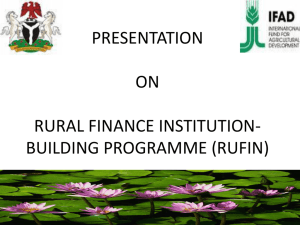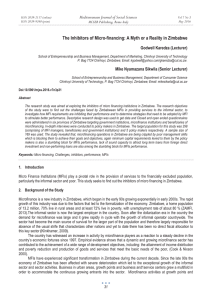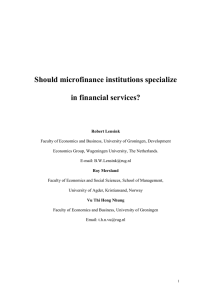Notes
advertisement
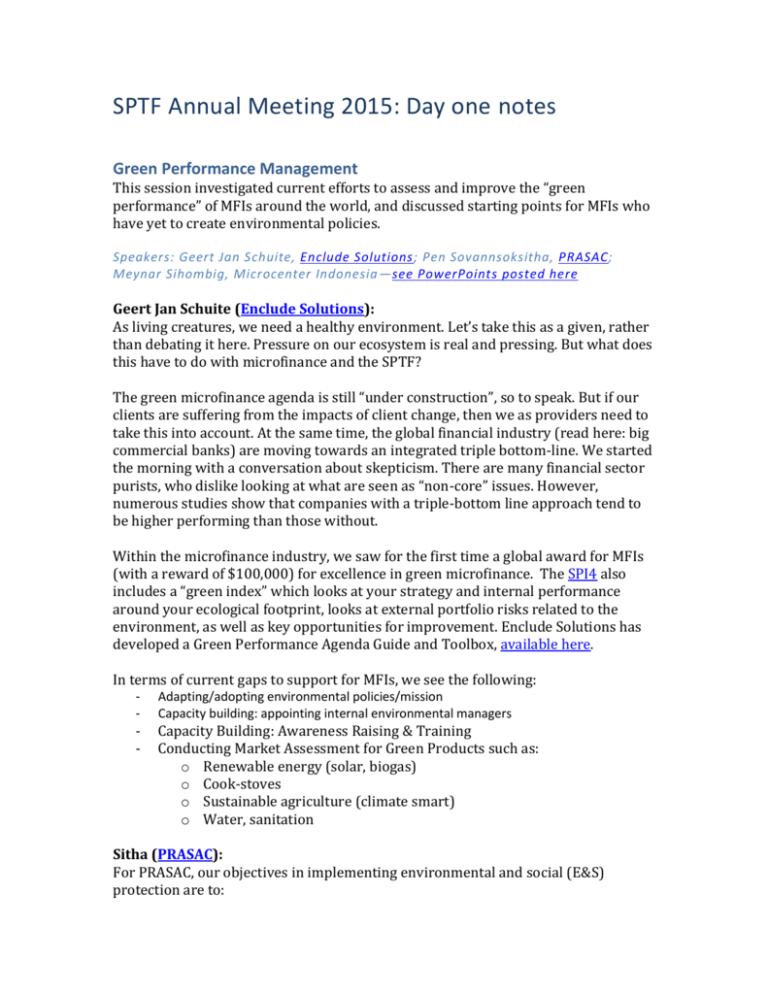
SPTF Annual Meeting 2015: Day one notes Green Performance Management This session investigated current efforts to assess and improve the “green performance” of MFIs around the world, and discussed starting points for MFIs who have yet to create environmental policies. Speakers: Geert Jan Schuite, Enclude Solutions; Pen Sovannsoksitha, PRASAC; Meynar Sihombig, Microcenter Indonesia —see PowerPoints posted here Geert Jan Schuite (Enclude Solutions): As living creatures, we need a healthy environment. Let’s take this as a given, rather than debating it here. Pressure on our ecosystem is real and pressing. But what does this have to do with microfinance and the SPTF? The green microfinance agenda is still “under construction”, so to speak. But if our clients are suffering from the impacts of client change, then we as providers need to take this into account. At the same time, the global financial industry (read here: big commercial banks) are moving towards an integrated triple bottom-line. We started the morning with a conversation about skepticism. There are many financial sector purists, who dislike looking at what are seen as “non-core” issues. However, numerous studies show that companies with a triple-bottom line approach tend to be higher performing than those without. Within the microfinance industry, we saw for the first time a global award for MFIs (with a reward of $100,000) for excellence in green microfinance. The SPI4 also includes a “green index” which looks at your strategy and internal performance around your ecological footprint, looks at external portfolio risks related to the environment, as well as key opportunities for improvement. Enclude Solutions has developed a Green Performance Agenda Guide and Toolbox, available here. In terms of current gaps to support for MFIs, we see the following: - Adapting/adopting environmental policies/mission Capacity building: appointing internal environmental managers - Capacity Building: Awareness Raising & Training Conducting Market Assessment for Green Products such as: o Renewable energy (solar, biogas) o Cook-stoves o Sustainable agriculture (climate smart) o Water, sanitation Sitha (PRASAC): For PRASAC, our objectives in implementing environmental and social (E&S) protection are to: - Reduce negative effect of clients’ business activities Maintain the environmental dignity and good health for the community Reduce child labor Educate clients to understand the importance of E&S protection Reduce credit risks What steps have we taken so far to deliver on this? • Put in place environmental and social protection policy and procedures • Staff trained about E&S protection and how to access the E&S risk • Loan assessment forms are well developed for Credit Officer to conduct the E&S risk assessment and discuss with client how to reduce E&S risks • Monitoring system is in place to monitor E&S performance • Annually report on E&S results More specifically: - - Environmental protection in the workplace: Compliance with national laws and regulation, creating a healthy workplace, smart electricity and water use, reducing office material consumption, and green workplace communications We offer a bio gas loan product o Loan amount: USD150 - USD1,000 o Interest rate: 1.2% per month or 14.40% per annum o Loan term: 3 months or 24 months o Pre-repayment: USD150 subsidy from National Biogas Program (NBP) o Repayment mode: Based on cash flow of the clients o Collateral: Land, farm and house title. We implement environmental and social risk assessments with our loans (see below) Key challenges we have faced in this product are: - Building awareness and trust among clients - Expansion of national grid & electricity connection price is USD125 - Fewer cows means less dung available as bio gas fuel inputs - Younger generation doesn’t want to engage in farming activities Quality control of biogas plant and enforcement is limited Lack of biogas constructors in some areas Construction of the biogas plants can take a long time The material or spare parts for the biogas plants and cookers are available in the market Next steps for us include: - Strengthen communication with local authorities. - Build strong collaboration between PRASAC officers and NBP officers and promoters at provincial level. - Develop promotional materials to increase product outreach - Offer preferential approval for biogas loans—the target is that at least 85% of farmers who request loan will be offered it, as long as they meet product requirements. - Set up an Environmental and Social Management System datasheet to track the environmental and social risk—to inform board of directors and management decision making. Meynar Sihombig (Microcenter Indonesia): MFIs in Indonesia are much smaller than in Cambodia and other Asian countries – so it’s important to note that we’re talking about differences in scale. In Indonesia, 60% of the population lives in East Java, and this is where most the MFIs are clustered as well. In early 2014, we started thinking about bringing green performance to Indonesia, arranging a training of trainers with Enclude. There’s been a positive ripple effect – now we not only have consultants working on this, but institutions taking up the green agenda as well. We also now offer institutional green assessments that include a field visit to clients. This is a good opportunity to educate loan officers by pointing out areas of potential improvements in clients’ business activities and inviting them to think of solutions. Results to date: • At a national Level, the Financial Service Authority has just introduced a “Roadmap for Sustainable Finance” • Client protection and complaints for Rural Banks • The issues of the environment and energy are now a constant subject of discussion in the national media • Green performance Assessment approach: MFIs are starting to think about a triple-bottom line approach. Some MFIs are giving incentives (lower interest rates) to clients that prevent and reverse environmental damage • Some MFIs are starting to change their mission and internal policies • Product development: some MFIs are starting to launch green products, including bio gas loans.
